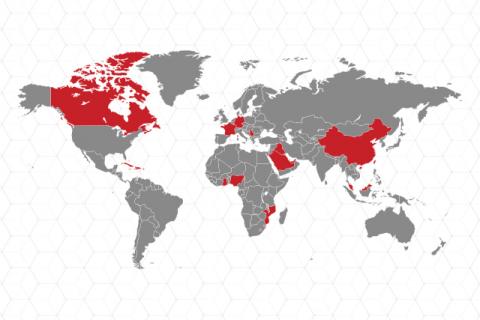Q&A: Dr. McAndrew Helps Bring Capitol Tech to the World
February 16, 2021Capitol Tech's Dean of Doctoral Programs, Dr. Ian McAndrew, has been invited to chair a new society, the International Mechanical Aeronautics and Astronautics Society (IMAAS). Capitology Blog sat down with Dr. McAndrew to discuss this honor.
Dr. McAndrew has been with Capitol Tech since 2018. He has spent 30 years in academia after working in the car industry, including 18 years at a university in the United Kingdom and 10 at a Florida-based university. Dr. McAndrew has served as chair for more than successful 114 dissertations and has published over 70 papers in engineering journals and conferences. He has five degrees, a PhD, two master’s degrees and two bachelor’s degrees; he is also a Fellow of the Royal Aeronautical Society and recognized as an international leader in aerodynamics research.
Question: What can you share about the new Society?
Answer: I am frequently asked to chair conferences all over the world. I have done about 50 or 60 all over the world: Singapore, Japan. Thailand. Before I came to Capitol, I was attending a conference nearly ten years ago and it was poorly run—no one knew what they were doing. I offered to help that year, and they asked me to come back and chair the conference for the next year. That conference was the International Conference on Mechanical and Aerospace Engineering (ICMAE).
Ever since then I have been chairing this conference. It has grown from 30, 35 delegates to 230 delegates. The conference falls under the Science and Engineering Institute (SCIEI). SCIEI wants to start a new society called the International Mechanical Aeronautics and Astronautics Society (IMAAS) and they have asked me to be the society chair. The goal of the Society is to disseminate information, share research, publish research, and share information at a global level.
SCIEI has four existing societies, making IMAAS the fifth. Eventually, the Society will have their own annual conference. IMAAS will be connected to the existing organization journal and hope to one day warrant their own journal, in which case I would end up as editor-in-chief. It is anticipated we could have 4-5 thousand members in a few years.
Q: Why do you think you were selected for this honor?
A: I work for a recognized American university that is surrounded by government agencies. We have links with experts who work at these agencies—via faculty, staff, and students. While I think it is in part in recognition of my work, I think it is also in recognition of the university. We are not a big player but we are recognized in the world we work in. When you look at what we have to offer, especially the degrees, it is pretty impressive. This all adds up to make me, and more so the university I work for, something that is gaining recognition. I think Capitol has been recognized for the quality of its work, faculty, and where we are expanding in the world.
Q: Where can people learn more about IMAAS?
A: More information will be shared on the SCIEI website, with an official “launch” planned for March. Students can also reach out to me directly. The society is free to join. At the ICMAE Conference, we will be encouraging members to join. I’m representing the American end. There are co-chairs that are representing Europe and Asia.
Q: How has Capitol Tech’s impact changed globally?
A: We currently have students in fifteen countries studying for doctoral degrees, and this global growth has largely occurred in the last two years. As we are expanding globally and our footprint of where we are in the world grows, the recognition of being involved in different things like IMAAS ultimately benefits the university. It gives us exposure to people from Australia, Japan, China, India, all over the world. It adds a way for us to show who we are and what we are, and that’s important. We’re more than a small school in Maryland.
In Spring 2020, we reached 200 registered doctoral students. Start of Spring 2021, we reached 330. In December 2020, the university’s 200th doctoral candidate completed their work. The majority of the increases in these numbers are just in the last few years.
Q: Anything else exciting happening with Capitol Tech doctoral programs?
A: Four new doctoral degrees began in 2020 (Counterterrorism, Cybersecurity Leadership, Quantum Computing, and Operational Technology). There are several new doctoral degrees planned for 2021, including one in space cybersecurity. We have also submitted applications to have a PhD in cyberpsychology. Despite the advances in technology, there is still the human element to address, and we expect this subject to be a significant subject in the field. The degree explores the psychology behind people who work for the military who then steal information, or the young person who is capable with computers that turns to the dark side and becomes a hacker instead of helping a nation or organization be safe. There are very few degrees on this topic and no doctoral degrees currently in America.



